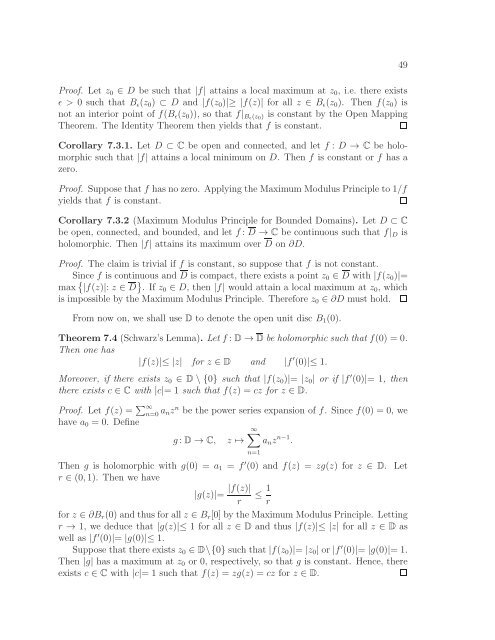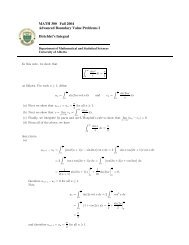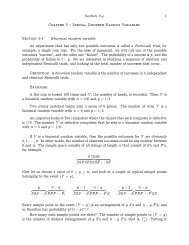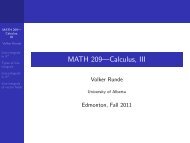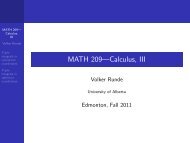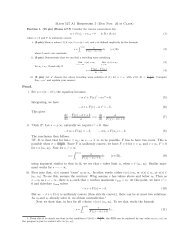Math 411: Honours Complex Variables - University of Alberta
Math 411: Honours Complex Variables - University of Alberta
Math 411: Honours Complex Variables - University of Alberta
Create successful ePaper yourself
Turn your PDF publications into a flip-book with our unique Google optimized e-Paper software.
Pro<strong>of</strong>. Let z0 ∈ D be such that |f| attains a local maximum at z0, i.e. there exists<br />
ǫ > 0 such that Bǫ(z0) ⊂ D and |f(z0)|≥ |f(z)| for all z ∈ Bǫ(z0). Then f(z0) is<br />
not an interior point <strong>of</strong> f(Bǫ(z0)), so that f|Bǫ(z0) is constant by the Open Mapping<br />
Theorem. The Identity Theorem then yields that f is constant.<br />
Corollary 7.3.1. Let D ⊂ C be open and connected, and let f : D → C be holomorphic<br />
such that |f| attains a local minimum on D. Then f is constant or f has a<br />
zero.<br />
Pro<strong>of</strong>. Suppose that f hasno zero. Applying the Maximum Modulus Principle to 1/f<br />
yields that f is constant.<br />
Corollary 7.3.2 (Maximum Modulus Principle for Bounded Domains). Let D ⊂ C<br />
be open, connected, and bounded, and let f: D → C be continuous such that f|D is<br />
holomorphic. Then |f| attains its maximum over D on ∂D.<br />
Pro<strong>of</strong>. The claim is trivial if f is constant, so suppose that f is not constant.<br />
Since f is continuous and D is compact, there exists a point z0 ∈ D with |f(z0)|=<br />
max � |f(z)|: z ∈ D � . If z0 ∈ D, then |f| would attain a local maximum at z0, which<br />
is impossible by the Maximum Modulus Principle. Therefore z0 ∈ ∂D must hold.<br />
From now on, we shall use D to denote the open unit disc B1(0).<br />
Theorem 7.4 (Schwarz’s Lemma). Let f: D → D be holomorphic such that f(0) = 0.<br />
Then one has<br />
|f(z)|≤ |z| for z ∈ D and |f ′ (0)|≤ 1.<br />
Moreover, if there exists z0 ∈ D \ {0} such that |f(z0)|= |z0| or if |f ′ (0)|= 1, then<br />
there exists c ∈ C with |c|= 1 such that f(z) = cz for z ∈ D.<br />
Pro<strong>of</strong>. Let f(z) = � ∞<br />
n=0 anz n be the power series expansion <strong>of</strong> f. Since f(0) = 0, we<br />
have a0 = 0. Define<br />
g: D → C, z ↦→<br />
∞�<br />
anz n−1 .<br />
Then g is holomorphic with g(0) = a1 = f ′ (0) and f(z) = zg(z) for z ∈ D. Let<br />
r ∈ (0,1). Then we have<br />
|g(z)|= |f(z)| 1<br />
≤<br />
r r<br />
for z ∈ ∂Br(0) andthus for all z ∈ Br[0] by theMaximum Modulus Principle. Letting<br />
r → 1, we deduce that |g(z)|≤ 1 for all z ∈ D and thus |f(z)|≤ |z| for all z ∈ D as<br />
well as |f ′ (0)|= |g(0)|≤ 1.<br />
Suppose that there exists z0 ∈ D\{0} such that |f(z0)|= |z0| or |f ′ (0)|= |g(0)|= 1.<br />
Then |g| has a maximum at z0 or 0, respectively, so that g is constant. Hence, there<br />
exists c ∈ C with |c|= 1 such that f(z) = zg(z) = cz for z ∈ D.<br />
n=1<br />
49


